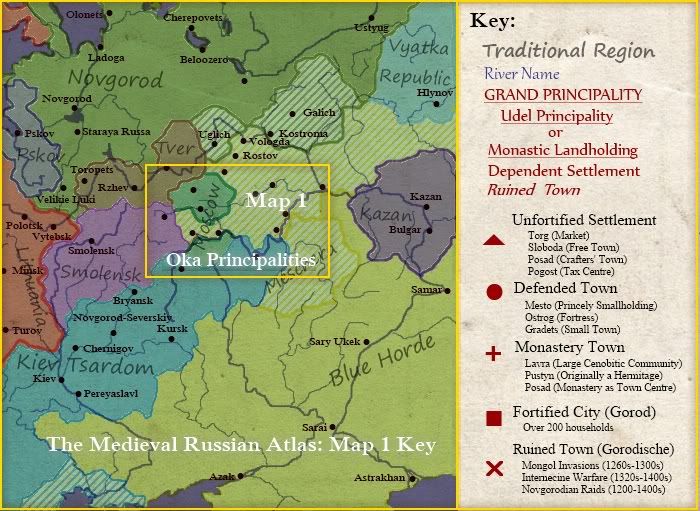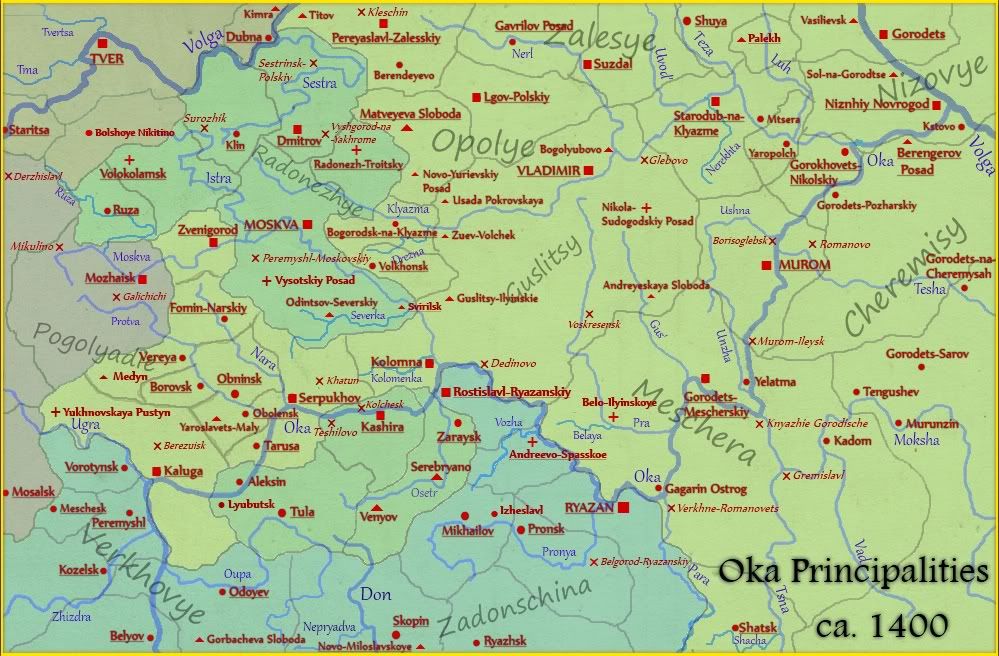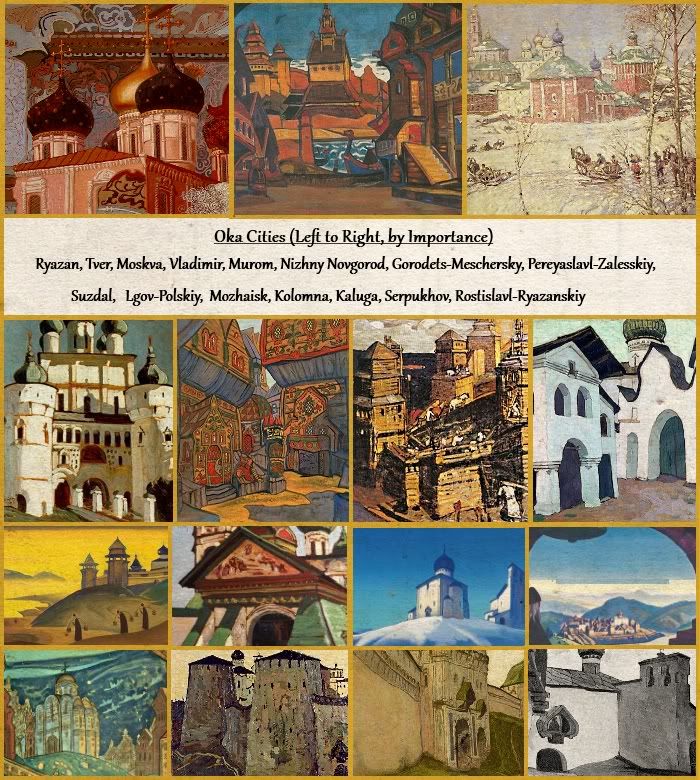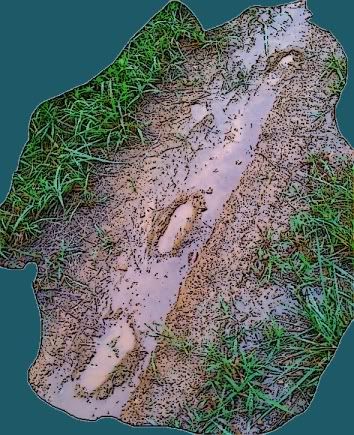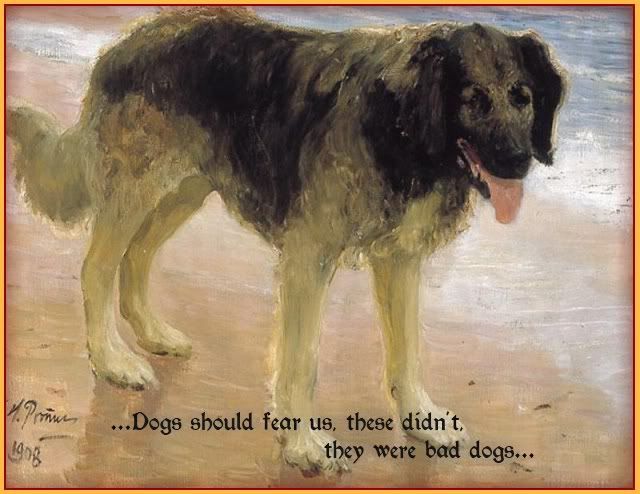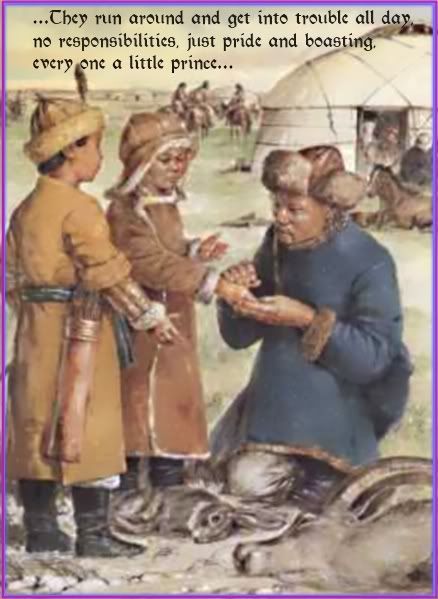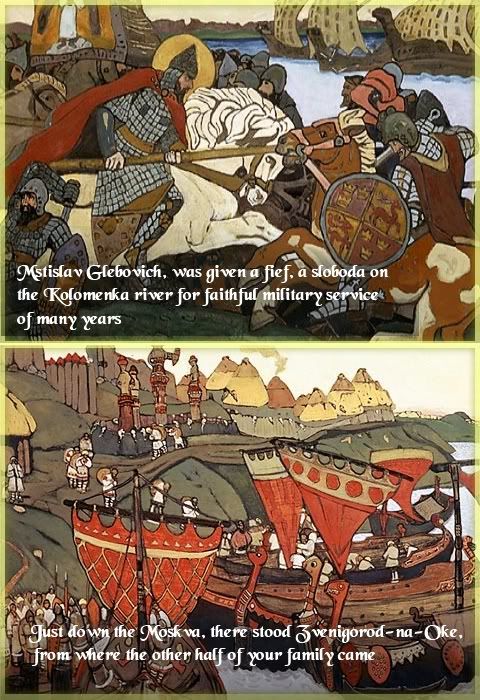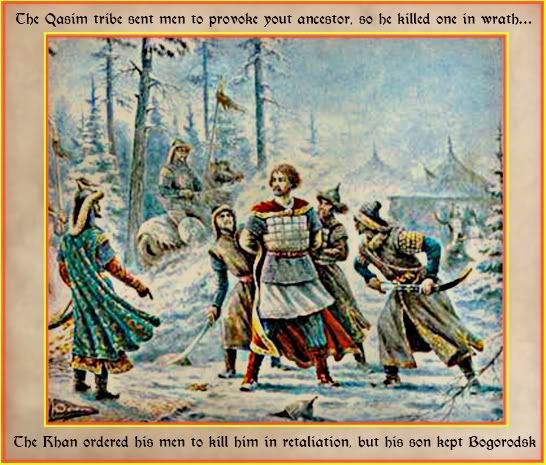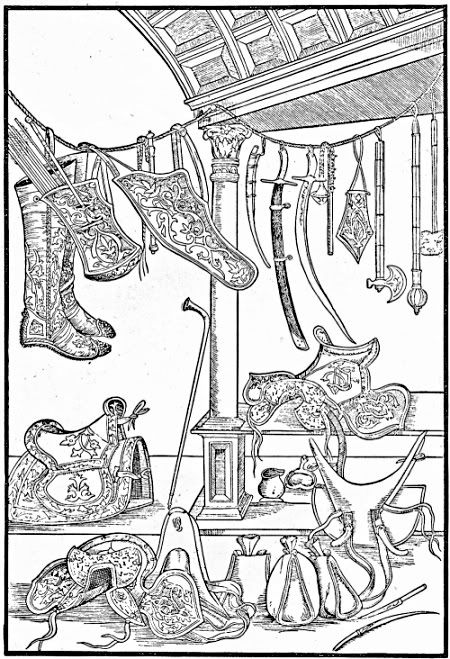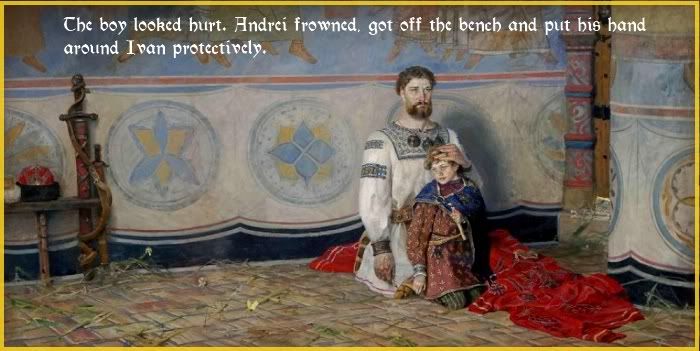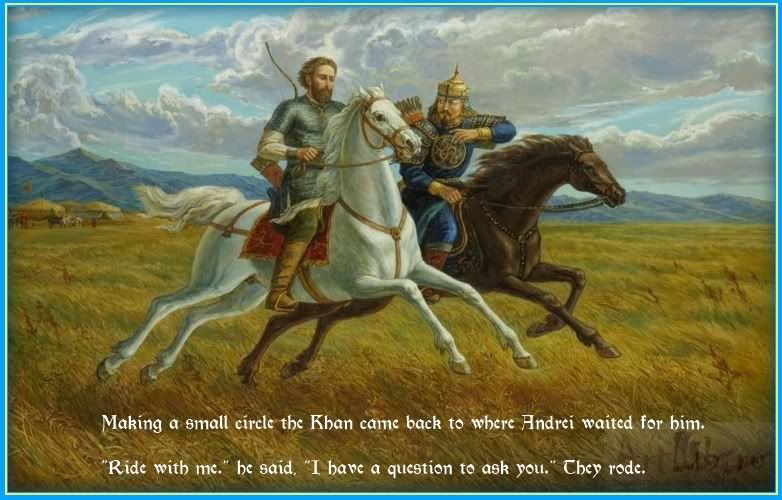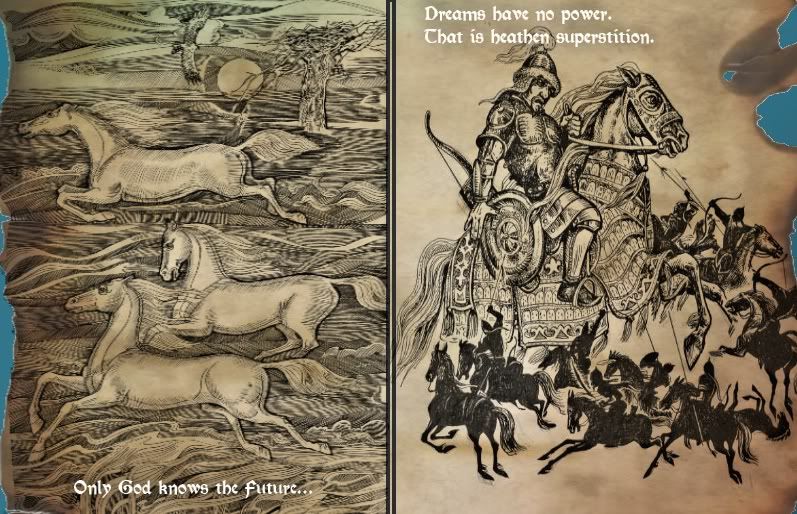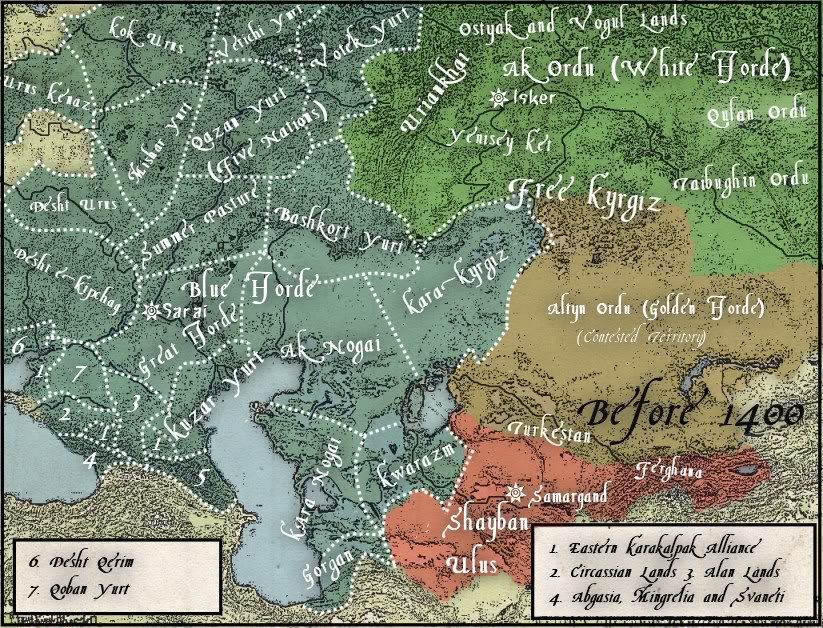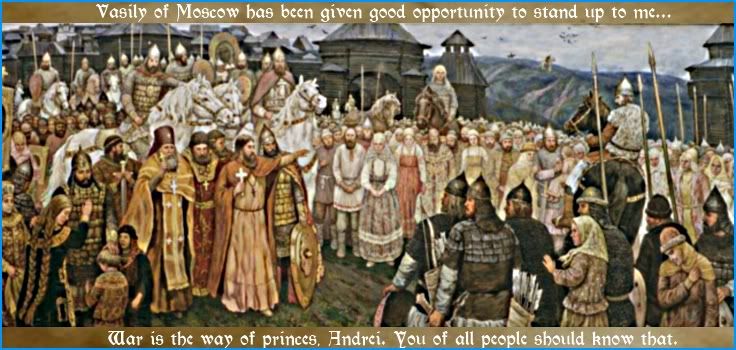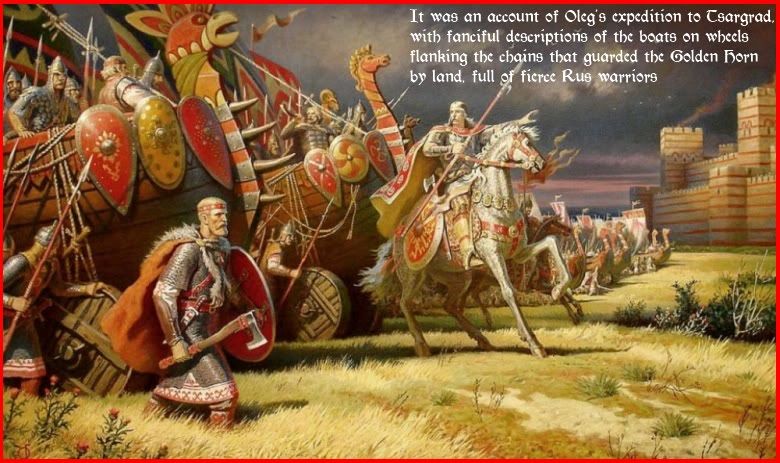From Rus to Russia
Waves of Blood and Grass
XIII
Andrei
Ivan stared at his uncle in fearful uncertainty. Andrey beheld his nephew with undisguised annoyed disapproval. The boy burst into the front room of the house all flushed with the excitement of the rough games in the Oglans' compound, covered in thick spring mud, but seeing his guardian's reaction instantly stopped the jubilant mood. At last he lowered his head and stared at the wooden floor and the muddy footprints he left there.
"You," Andrey said at last, grabbing his shoulder and pushing him ahead of himself "wash."
The basin of water in the store-room was cold. The boy shivered as he cleaned himself of the dirt and the grass. Andrey sat down on a nearby bench, cleaning the scabbard of the
saadak knife with a bit of oil and cloth.
"Just what and who do you think you are? A tatar? Some drunk raider's oglan? What do you think we are doing here?"
Ivan remained silent.
"Well, answer me! I've already made my mind up about your punishment, you won't make it worse"
"I am of Rurik's blood"
"Ah, now you decide that. It helps when you're not all covered in mud. What does it mean to you?"
"We have a destiny," he repeated the oft-told lesson.
"But it eludes us - for now. What were you doin that was so important and muddy?"
"The Old Khatun couldn't find Mikai, so she sent Idree and Gantoo to find him. I was with them so I went too. He wanders off sometimes and she's too old to always keep watching him. He ran away through the kitchen and down to the alley behind the palace and almost to the meat row, but then there were dogs. We chased them off when we found him, and then afterwards I stayed with them because we went to find the dogs and beat them. Dogs should run scared of us, these didn't, they were bad dogs. And then we just played by the river with some other boys and shot at the reeds with Idree's bow. And then some of them wrestled"
"My brave
baatur. Defeating monsters, drawing mythical bows. I hope you didn't defeat a prince with your mighty arms."
"You tell me not to. I could!"
"I also tell you to not go out without telling me, and I tell you not to wreck the clothes, and there's many things I tell you. It's good that you listen to me at least in this; don't beat any of them. You don't need enemies at your age."
"Idree's my friend."
"Idree, God willing, will be Khan one day. So don't beat him. So for this you skipped your lessons, wrecked your clothes, and nearly had me looking around the city myself, because those fool grooms missed your escape. St.Ilias give me strength, who do you think you are?
Let the Khan's kids play, that's all they do, anyway. Leave them with their grandmothers so they run around and get into trouble all day, no responsibilities, just pride and boasting, every one a little prince. Then they grow up, fine men all, and all they can do is shoot a bow and drink and drink and drink and maybe ride a horse when not too drunk. Can't count, can't write, can't say prayers without assistance. Then suddenly they're told they are supposed to do great things – rule Empires, lead armies. So they have to learn everything all at once. And some never learn -"
He shook his head.
"Soon all the people who do that for them – what, the Persians and the Jews and the Greeks and even our own – will run this place and the great line of the Khans shall wither. All their pride and all their glory will not help them. All because they ran around like puppies when they were young instead of coming home and studying like they were told. I ought to beat you until you get that, you know? All the wise men say so. Read any book."
Ivan's face went white.
Andrei looked at him sideways, then relented.
"Next time you do this, I just might. So, Rurik's blood – what are we doing here?"
"We're here so that we may win back Kolomna," he said, automatically.
"That's right. We won't be here forever. It's your birthright, Ivanushko. Long ago, when Vasili-Vsevolod ruled over the Orthodox world from Tsargrad, my and your ancestor, Mstislav Glebovich, was given a fief, a sloboda on the Kolomenka river for faithful military service of many years. And just down the Moskva, there stood Zvenigorod-na-Oke, from where the other half of your family came. Then, when the Khans first rode in from the south, they burnt both down; but Kolomna had no walls and the people dispersed, and in strong Zvenigorod they fought valiantly and were killed. So when Kolomna was rebuilt, the last Zvenigorod prince moved all his surviving people to the same spot, and built himself a
terem on the opposite end of the village.
Sometimes they lived peacefully, and sometimes they fought. In a feud, Prince Gleb Kolomin killed Vasiliy Zvenigorodskiy, and ran for his life with his sons from his brother's town. He went to the court of the Khan, but died an exile. His son Yaroslav Glebovich served the Khan, and the Khan wanted to reward him Nichyeva Sloboda. But there was another, a Tatar exile prince by the name of Iskender Qasim, and he wanted it himself. Yaroslav had a dream in which the Mother of God told him to challenge Iskender, and he did, and won. That's why we call it Bogorodsk now, and Iskender took service in the field and won himself a new town, Gorodets-Qasimov."
Andrei put away the knife and took up the
djid case, continuing to work with the oil and cloth.
"Qasim's tribe were angry at the humiliation and sent men to provoke yout ancestor, so he killed one of them in wrath; and the Khans – know this, Ivan – they consider our noble blood as less than theirs. He ordered his men to kill Yaroslav in retaliation, but let his son keep Bogorodsk, and Lev Yaroslavich was my grandfather.
My father, he managed to secure the marriage of your father, Dmitriy, to my sister, and thus united our line with the last of Zvenigorod's. So you have good claim from both sides, and I will pass it to you after I die. Bogorodsk and Kolomna both, God willing. My obstacle is Fedor Svirilskiy. He is also my grandfather Lev's descendant, but some say his mother was heavy with him before she wed his father. Our claim is better, and that's why we're here."
He looked up, finally, from the familiar tale that he told mostly for his own benefit, to see the boy standing still and quiet by his side, dressed in whatever clean clothes were left.
"What is it?"
"You're getting the
saadak ready for travel"
"I am."
"Are we going to Bogorodsk then?"
"No – but I have... a feeling...I have a journey ahead of me. It's good to be prepared."
"Should I help you? Go downstairs and get the horse ready?"
"No need – I'd have to do it all over again."
The boy looked hurt. Andrei frowned, got off the bench and put his hand around Ivan protectively.
"Oh, leave it be, I didn't mean it like that. The horses are big and you're too small. You can't reach everywhere and the warhorses won't take you seriously in any case. Besides, you're still to be punished."
"Yes, uncle"
"Because you skipped the morning tutors today, you're going to have to make up for it. Take some paper – yes, don't worry, paper – and write something to fill it neatly. Don't be fancy, be legible, and clean. People should be able to read what you wrote two hundred years from now, hear me?"
"It won't last that long! Father Gavriil says the world will end in a hundred years anyway."
"Well – you never know. Write it like you still want it to last forever."
"What should I write about?"
"Anything you want. Perhaps something you learned by heart before. And neatly! You'll be sorry if it's not."
"I will!"
"There's bread and fish left from this morning. Go ask Avdotko. Tell him I'm not sure how you slipped by him, but that he should grow extra eyes for that purpose by the time I come back"
The boy stared at him, stunned at the idea of many-eyed people.
"A jest. Go, start writing"
Andrei let the boy go, then straightened his shirt, thought about putting the formal kaftan on for the important talk, then decided on the russet
deel, wrapping it around himself and finishing it off with a wide belt. Finally presentable, he left his house and made his way down the main road and into an alley shaded by the few stone houses in Sarai, taking a shortcut to the side gate of the palace, and finally to the front door.
"What is your business?" the captain on duty demanded lazily.
"The vizier wanted to see me about the hunting horses for next week," Andrei lied easily, and the captain waved him through pretending to believe. Though he wasn't able to secure an appointment with Togli Altyn for several weeks now, he was a frequent visitor over the last three years. There his luck ended; having passed the door he ran straight into the Khan's ceremonies minister, responsible to appointments.
"Andrei-baghatur," the man smirked, calculatingly, "it is nice to see you; God has blessed this day to bring about our meeting."
"Indeed, God is bountiful,
Yerenkhebek"
"I was wondering, going through the notices yesterday, did you tire of sending requests? But I see you decided to come yourself. Very well."
"It will not take much of the Great Khan's time."
"Oh, I rather think it will. I was actually on my way to get someone to go to your house and fetch you. I hope you have your horse ready – the Khan has decided he wants to ride out today and you're to come with him."
Andrei looked at the minster suspiciously. Togli Altyn in the last few years had aged quickly, and turned from a stressed, thin young man to an irritable middle-aged one with too much flesh on his bones and little apparent interest in hunting. He once again banished the feeling that he should have forseen this – dreams had no power of prophecy, even if they spoke of hoofbeats. Then he went to get his horse, with an assigned excort watching over him.
The Khan was in the field by the river, just past the encampment of the royal Horde. The guards fell back, and Andrei slowly brought his horse up to meet his liege. Togli Altyn was riding in circles around a target post, with grim concentration sending arrow after arrow at it. His focus, however, was forced – perhaps one shot in three went astray. His horse, as out of practice as its master, made the occasional misstep, making matters worse.
"Great Khan," Andrei greeted him from a distance. There was no reply, just more circling, more attempts, more missed shots. The grass around the post was torn until the earth underneath it showed. At last, in frustration, Togli Altyn growled an obscenity, spurred the beast at the post and brought it down with the sabre. Making a small circle he came back to where Andrei waited for him.
"Ride with me." he said, "I have a question to ask you."
They rode.
"Did you dream about anything unusual today?"
The question shook Andrei badly.
"Great Khan – dreams have no power. That is heathen superstition. Only God knows the future."
"Yes, so you say. But what did you dream of? You must have, since it affects you."
Reluctantly, Andrei began -
"I dreamt I saw a falcon with grey wings flying above a white horse, like they were racing, and at first it looked like the falcon might have the upper hand...but the horse was joined by another, and then again another, and every time they grew faster, their hoofbeats so loud they drowned out the very beating of the heart. At last the falcon fell behind, and grew tired, and weakened...and beaneath him was a wide river."
"And then?"
"I don't remember."
"You dreamt of time running out, then. Ill omen."
"God alone -" Andrei began, but Togli Altyn cut him off with a shake of his head.
"My dream was different, but also disturbed me. I thought I saw a
baghatur, a hundred feet tall, on a horse as big as a hill, all in mail, ride across the plain. His hoofprints left lakes behind them, and forests grew where his steel-tipped arrows fell and undid farmland. None could stand against him, and yet – yet – a hundred lesser ones came, and fought him, and every time he smote one another rose in his place. They beset him from all sides, until he fell, and the mountains themselves with him. What make you of this?"
"You worry."
"I do. I have cause. In truth, it's not as much premonition as proof of something I feared"
"And since you called me – it must mean that there's trouble with the North."
The Great Khan almost winced.
"I failed you, my friend, and more. This Kolomna business, it had only sharpened the knife that they kept hidden, ready to stab me. Not only did it give Vasily of Moscow a good opportunity to stand up to me, it also made their churchmen question the authority of Sarai. They will want intervention from Kiev's metropolitan. It could lose me what few loyal cities and princes I still have."
"I've become a liability."
"I will admit, you made things worse, but not the way you think. I was consdering, on advice from others, that winning you your patrimony was too much risk for too little gain. I was going to trade it away – it may hurt you, but it is my right. I gave you some land income from around here already. I was also going to reward you permanently with a fief somewhere else, perhaps in Yelets, after we brought those untaxed, unauthorised
slobodas under firm rule. The worst thing is that it wouldn't help. Trading it away to Feodor or another of Vasiliy's pets would only give them more towns to draw strength from when they are going to confront me over the other land conflicts that fester...and if I cannot compel the strongest of them to bow to me, the rest of them will join him."
"So you will force Vasiliy to humble himself?"
"I've given permission to the noyons to start probing the land, collect the taxes early, burn a few pogosts if they must as a warning. But there must be a confrontation."
"He won't come to Sarai then?"
"He wont."
"So Rus will burn and both the Khan and his foolish servants will grow weaker."
"War is the way of princes, Andrei. You of all people should know that."
"So it really is war."
"Not yet. I fear this unhappiness of the priests; what if Keistut of Kiev decides to exploit it?"
"What can you do about it?"
"Send you to Kiev."
Andrei stopped his horse altogether.
"Me?"
"Not as an envoy – I need to decide on the gifts first. Nor as a spy, you're far too noble for that. But as something else – you see things differently, and you won't constrained by protocol or my agents there. I feel that it would do my cause good; and it would do you good."
"It must be something else. You're getting rid of me."
"It would help, yes, if you were not in Sarai in the next few turns."
"Whoever is telling you to do this should be himself be watched," Andrei spat out, bitterly "I say this as a friend."
"I'm not a complete fool,
baghatur! I may have had to learn everything too quickly and alone, but I am telling you that I am not that foolish," the Khan, replied, narrowing his eyes angrily. "Still, I cannot say more. There are things still unclear to me, and telling you won't help.
Ah, by the Christ himself, I wish I didn't sleep through the last years. I thought I was awake and working madly, but I was really still asleep and only dreaming I was. While I slept, my enemies have surrounded me, and now I must find them in the dark."
"I'm not your enemy."
"Which is why I am sending you to Kiev. Maybe you can find out if it's worth sending envoys at all, and if not, maybe you will make it worthwhile. I have faith in this."
"When do you want me gone?"
"Soon. As soon as you can manage."
"Ivan?"
"He can stay in the palace for the time being. He's a fine
oglan, your nephew."
"And this must be"
"It must. It is my will. It is also for the best," the Khan concluded with an air of finality, then turned the horse and headed to the city under the darkening sky.
Andrei returned to his house to find Ivan's head laid on the writing table, the boy deeply asleep. Next to him lay the paper, covered in letters written with a childish, but promising hand. Andrei picked it up and read it. It was an account of Oleg's expedition to Tsargrad, with fanciful descriptions of the boats on wheels flanking the chains that guarded the Golden Horn by land, full of fierce Rus warriors, destined to nail their shield to the gates of the Imperial capital. Despite himself, he smiled, because the boy's dreams were happier than his own.
 It's a shame that the Norse never had any real interest in America. A king sponsored conquest, now that's something that should've happened!
It's a shame that the Norse never had any real interest in America. A king sponsored conquest, now that's something that should've happened!

